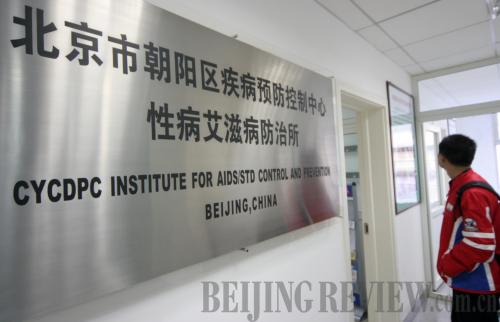|
 |
|
FRONT LINE: An institute for AIDS/STD control and prevention in Chaoyang District, Beijing, is equipped to identify cases of adult-onset immunodeficiency (CFP) |
A disease that can cause AIDS-like symptoms recently has aroused public concern.
"So far, there has been no reported case of adult-onset immunodeficiency on the Chinese mainland," said Deng Haihua, a spokesman for the Ministry of Health, at a press conference in Beijing on September 11.
Despite this, Deng said that the Chinese Center for Disease Control and Prevention is already equipped with related techniques and equipment, and will strengthen monitoring over the disease.
The disease was discovered by scientists from the United States, China's Taiwan and Thailand, who published their findings in the New England Journal of Medicine on August 23.
Like AIDS, the disease impairs people's immune system, weakening their ability to fight off infection; yet, unlike AIDS, it does not seem to be contagious, and no virus has been found in patients, said the scientists.
Although the disease causes acquired immune deficiency syndrome like AIDS, it damages a different part of the immune system.
While HIV destroys germ-fighting T-cells, the new disease produces antibodies that block interferon-gamma, a molecule crucial to normal immune functioning, leaving people vulnerable to viruses, germs, fungal infections and parasites.
In an interview with China National Radio in early September, Wu Zunyou, Director of the Chinese Center for Disease Control and Prevention, did not rule out the existence of cases of adult-onset immunodeficiency on the Chinese mainland. He said that perhaps they have not caught the attention of medical doctors.
Disease control departments on the Chinese mainland have already started to make technical preparations to identify the disease, according to Wu.
"If an immunodeficient patient tests negative for HIV, doctors can consider measuring the level of the antibodies that block interferon-gamma to determine whether the patient has the AIDS-like disease," he said.
The disease is said to usually afflict Asian adults around age 50. According to the Associated Press, the first case of the AIDS-like disease was reported in 2004. More than 200 cases have been confirmed, most of which are in Thailand and China's Taiwan, and some in the Asian community in the United States.
The cause of the disease is still unknown. Scientists suspect genetic and environmental factors are to blame. The disease does not appear to be hereditary.
"It's still possible that an infection of some sort could trigger the disease, even though the disease itself doesn't seem to spread from person to person," Dennis Maki, an infectious disease specialist at the University of Wisconsin in Madison, told the Associated Press.
A number of factors have been known to lead to immunodeficiency, including genetic defects, cancer, radiotherapy, chemotherapy, and mental illness, according to Zeng Guang, Chief Epidemiologist with the Chinese Center for Disease Control and Prevention.
Zeng said that immunodeficiency is not something new, and for many years, a large number of immunodeficiency sufferers showing various symptoms have seen doctors. "Only that now, as science and technology develop, people have gained new understanding of this type of disease," he said.
| 